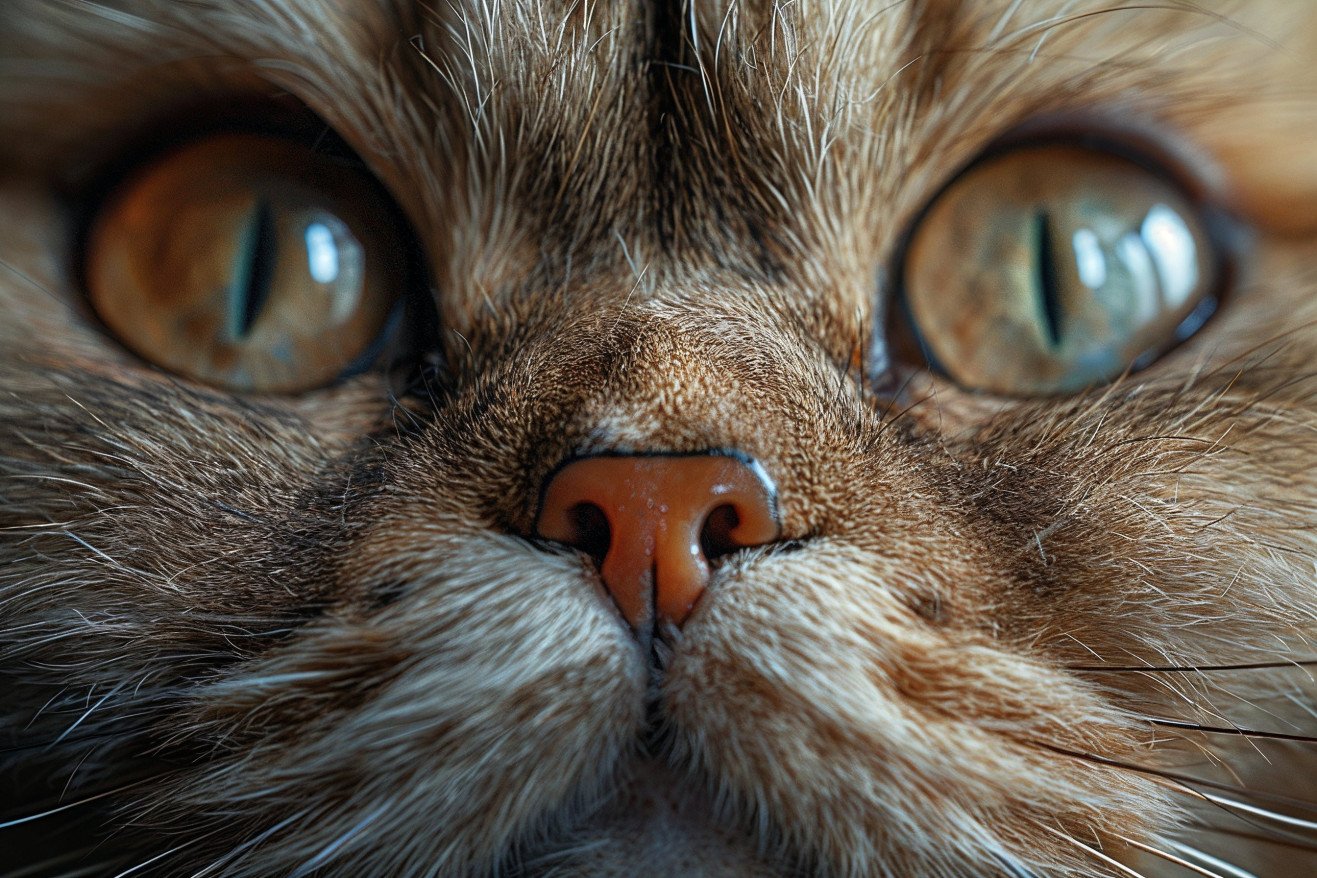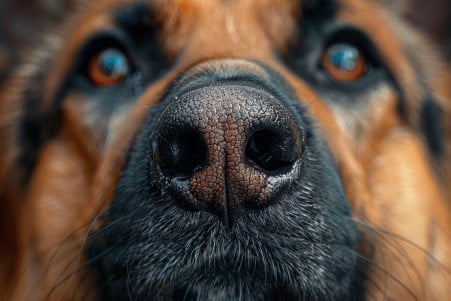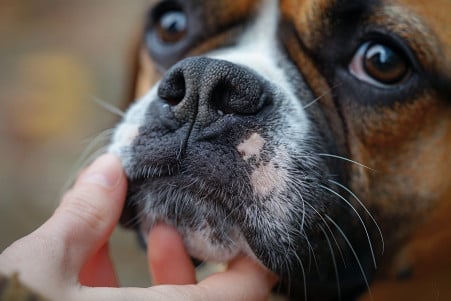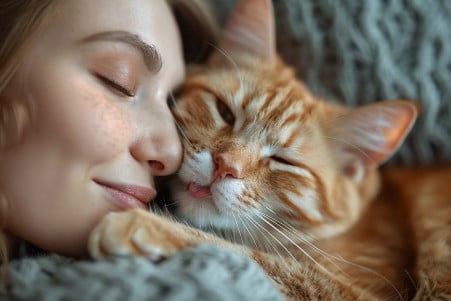Why Are Cats' Noses Wet? Science-Backed Reasons
15 May 2024 • Updated 14 May 2024

Cats' wet noses have a number of important biological purposes, including helping cats make the most of their highly evolved sense of smell and regulating their body temperature. Cats have a unique olfactory system that includes a vomeronasal organ that's responsible for detecting pheromones. This organ needs to be moist in order to work, and that's why cats' noses are wet. The moisture also helps the nose capture and process scent molecules in the air, which is how cats use their sense of smell to understand the world around them.
We'll explore a variety of scientific studies that shed light on the biological reasons behind cats' wet noses. From research in evolutionary biology that looks at the origins of the trait to information from veterinarians that explains why it's important for cats' health, we'll learn about the many ways that nature has given cats this amazing sensory adaptation. This knowledge will give us a better understanding of how cats work and how they're able to sense the world around them.
Why are cats' noses wet?
The Vomeronasal Organ: A Cat's Secret Weapon
Cats have a special sense organ called the vomeronasal organ, also known as the Jacobson's organ. This organ is located on the roof of the cat's mouth and has ducts that open into the mouth and the nose, allowing it to sample scents in a unique way.
According to Cat Behavior Associates, the vomeronasal organ's main function is to detect pheromones, which are chemical signals found in things like cat urine. Intact male cats use the organ to detect when females are in heat. Cats use their tongue to flick scents up to the vomeronasal organ, which causes the cat to make the characteristic "flehmen reaction" facial expression with curled lips and an open mouth.
A study published in PMC looked at the complex anatomy of the feline vomeronasal organ and found that the duct of the organ is lined with several different types of epithelium along its length, including receptor epithelium that is specialized and closely associated with nerves, as well as connective tissue, glands, and blood vessels. This complex structure helps the vomeronasal organ detect and transmit chemical signals to the brain.
As The Cat Care Clinic notes, the vomeronasal organ is important in pheromone communication between cats, which is important in mating and territorial behaviors. The organ's ability to sample nonvolatile substances is a perfect complement to the main olfactory system, which samples volatile substances, and together, they give cats an incredibly sensitive sense of smell.
Biological Reasons for a Cat's Wet Nose
A cat's wet nose is cooler and more moist, which helps them better detect scents and figure out where they are coming from. K&H Pet Products explains that cats have a scent gland called the Jacobson's Organ that enables them to smell by opening their mouths and inhaling, and a wet nose is better for this. Cats may lick their noses to either get more scent particles to the Jacobson's Organ or to reset and remove residue that could interfere with their sense of smell.
The amount of wetness on a cat's nose can change due to environmental factors like humidity and temperature, and physical factors like age and health, according to Animal Friends. A wet nose also helps cats cool down, since they sweat through their noses and paw pads, says the ASPCA.
A Dry Nose: Potential Health Concerns for Cats
Although a dry nose is not always a cause for concern, it can be a sign of an underlying health issue in cats. According to the Corydon Animal Hospital, a suddenly wet nose can be a sign of an upper respiratory infection, and a consistently dry, warm nose can be a sign of dehydration, skin issues, or respiratory issues.
If a cat has discolored nasal discharge, such as yellow or green, it can be a sign of an infection and should be checked out by a vet, according to Catster. Clear nasal discharge can be a sign of allergies or other respiratory issues. Hill's Pet also says that if you notice any major changes in your cat's nose, including dryness, cracking, or unusual discharge, you should have your vet check it out to make sure there are no health issues.
Whiskers and Wet Noses: Temperature Sensing
Cats can sense temperature changes through the moisture and blood vessels in their noses, says Crazy Cats Lady. This enables them to quickly sense changes in the temperature around them and adjust their behavior to find a cooler or warmer place. The evaporative cooling that comes from the moisture in their noses also helps cats maintain their body temperature, which is especially important for cats that live in the hot desert.
Whiskers are specialized sensory organs that detect changes in the environment, including changes in air currents, pressure, and temperature, and they are rooted deep in the skin, according to Cats on Broadway Veterinary Hospital. Whiskers and a cat's wet nose work together to give cats information about their environment, enabling them to move through the world while adjusting to changes in temperature and other environmental factors.
How to Make Sure Your Cat's Nose Stays Healthy
Making sure your cat has access to fresh water is the most important thing you can do to prevent dehydration, which can lead to a dry nose, according to Animal Friends. You can also use a humidifier in your home to help keep the air moist, especially during dry seasons and if you live in a dry climate, to help keep your cat's nose moist.
If your cat's nose is dry or crusty, you can gently wipe it with a damp cloth, according to Catster. However, make sure to keep an eye on your cat's nose for any other changes in color, texture, or discharge, and contact your vet if you notice anything unusual, according to Hill's Pet.
Making sure your cat has access to a cool or shady area can also help keep their body temperature down, especially in the summer, which is important for keeping their nose healthy and moist, according to Crazy Cats Lady.
Conclusion: The Fascinating Functions of a Cat's Wet Nose
The wetness of a cat's nose is an amazing adaptation that has a number of important functions, from helping cats better detect and understand scents to regulating their body temperature. The vomeronasal organ and the wetness of a cat's nose work together to detect and analyze scents, including pheromones, which are important for communication and behavior.
The wetness of a cat's nose can change due to a variety of environmental and physical factors, and big changes in the wetness of a cat's nose can be a sign of an underlying health issue that needs to be addressed by a veterinarian. Understanding the biological processes that cause a cat's nose to be wet can help you better understand and appreciate the complexity and sophistication of these amazing animals.
Keeping a cat's nose healthy and at the right level of wetness is important for their overall health and their ability to effectively interact with and understand their environment.


